- Home
- Mark R. Levin
Rediscovering Americanism Page 4
Rediscovering Americanism Read online
Page 4
Another condition must also be satisfied before an expert administration can expect to obtain popular confidence. Its authority will depend, as we have seen, on its ability to apply scientific knowledge to the realization of social purposes; and if a social science is unattainable or does not command popular respect, popular opinion will be reluctant to grant to the administration its necessary independent authority. Now in what way can a body of social knowledge be made to command popular respect? In the long run, doubtless, by increasing demonstration that social knowledge is the fruit of a binding and formative social ideal and that it is really serviceable for the accomplishment of a social program. But is such a demonstration sufficient? Is there not another and equally necessary method of increasing popular confidence in the expert—the method of giving a much larger number of people the chance of acquiring a better intellectual training? Is it fair to ask millions of democrats to have a profound respect for scientific accomplishments whose possession is denied to them by the prevailing social and educational organization? It can hardly be claimed that the greater proportion of the millions who are insufficiently educated are not just as capable of being better educated as the thousands to whom science comes to have a real meaning. Society has merely deprived them of the opportunity. There may be certain good reasons for this negligence on the part of society; but as long as it exists, it must be recognized as in itself a good reason for the unpopularity of experts. The best way to popularize scientific administration, and to enable the democracy to consider highly educated officials as representatives, is to popularize the higher education. An expert administration cannot be sufficiently representative until it comes to represent a better educated constituency.13
Croly also condemned capitalism and private property rights. Writing in The New Republic on October 27, 1920, he asserted: “The unanswerable indictment against capitalism as an American institution is not that enterprising businessmen seized and exploited the opportunities and power which society placed at their disposal. It was natural and even necessary that they should organize production and distribution on a basis more profitable to themselves than to society. The offense against the American national welfare with which they are indictable is of a different kind. It is their blindness to the social penalties of their methods of hiring, firing and playing labor and their refusal to make the technical and social education of their employees a charge upon business or upon the businessman’s state. . . .”14 In this regard, Croly expressed the view held by all progressives, Democrat and Republican, in his era and since, that industrial America and, therefore, capitalism create an economic and social class system, different in specifics but not necessarily in kind to that described by Karl Marx (Marx’s ideology to be discussed briefly later). Indeed, in condemning the progressivism of both major political parties as too tame, and encouraging support for a third party, the Farmer-Labor Party (essentially a socialist-workers’ party), Croly complained that “[p]ractically all of the educational groundwork in public opinion for a Farmer-Labor party still remains to be done. Marxism Socialism has the advantage both of a definite creed and a Bible [The Communist Manifesto] which focuses the convictions and emotions of its adherents. . . .”15 The overlap in the progressive and Marxist mind-set is simply inescapable.
Like most progressives, then and now, Croly became increasingly frustrated with the supposed slow pace of the nation’s transformation.
As a progressive democrat whose faith survives the contemporary eclipse of progressivism, I am not willing to impute the triumph of unreformed and unrepentant party politics and economic privilege to the superior reality of their principles. It is due rather to the unreality which liberals have allowed to pervade liberalism. They have not studied the meaning of their experience and failures during the last twenty-five years. They have not as the result of this experience divined the need of adopting a more radical and realistic view of the nature and object of a liberal agitation under the conditions of American democracy. They accepted in the beginning and continue to accept certain assumptions about the seat of effective power in the American commonwealth and the relation between the state and social progress which condemn them to remain either the uneasy accomplices or the impotent enemies of the powers that be in American society. Progressives have assumed that the American commonwealth, as now instituted and operated, is a complete and essentially classless democracy whose citizens can cure its ailments and adjust its conflicts by virtue exclusively of political action, agitation and education. This assumption they share with their adversaries. It has falsified and will continue to falsify the American progressive movement. If progressives wish to vindicate their claim to serve as indispensable agents of American national fulfillment they will need to consciously abandon it.16
As will become clear, Croly was not alone in this outlook.
Incredibly, Theodore Roosevelt (1858–1919), America’s twenty-sixth president (1901–1909), was a Croly admirer. Post-presidency, he was especially influenced by Croly’s 1909 book, The Promise of American Life, which apparently was first drawn to his attention by Learned Hand, a very influential federal district judge, progressive, and a disciple of Croly’s work. Hand wrote to Roosevelt: “I hope that you will find in it as comprehensive and progressive a statement of American Political ideas and ideals as I have found. I think that Croly has succeeded in stating more adequately than anyone else,—certainly of those writers whom I know,—the bases and prospective growth of the set of political ideas which can be fairly described as Neo-Hamilton, and whose promise is due more to you, as I believe, than to anyone else.”17
On January 21, 1911, Roosevelt published an essay in the Outlook, where he was an associate editor, in which he wrote: “In Mr. Herbert Croly’s Promise of American Life, the most profound and illuminating study of our National conditions which has appeared for many years, a special emphasis is laid on the assertion that the whole point of our governmental experiment lies in the fact that it is a genuine effort to achieve true democracy—both political and industrial. The existence of this Nation has no real significance, from the standpoint of humanity at large, unless it means the rule of the people, and the achievement of a greater measure of widely diffused popular well-being than has ever before obtained on a like scale. . . .”18
A few months earlier, on August 31, 1910, Roosevelt gave his well-known “The New Nationalism” speech, widely admired and cited by modern progressives. The phrase—new nationalism—was actually coined not by Roosevelt but Croly.19
Like Croly and other progressives, Roosevelt dismantled and reinterpreted the Declaration of Independence, for he understood its principles stood as obstacles to the progressive mission. “In name we had the Declaration of Independence in 1776; but we gave the lie by our acts to the words of the Declaration of Independence until 1865; and words count for nothing except in so far as they represent acts. . . .”20 Unlike an earlier Republican president, Abraham Lincoln, at no time during his speech did Roosevelt actually mention, let alone discuss, the Declaration’s principles and their application to the nation and the Constitution. Nothing about “the Laws of Nature and of Nature’s God,” “a decent respect to the opinions of mankind,” or that “We hold these truths to be self-evident, that all men are created equal, that they are endowed by their Creator with certain unalienable Rights, that among these are Life, Liberty and the pursuit of Happiness.” Nor did Roosevelt note that Lincoln used the Declaration’s principles, morality, and language as a foremost justification for prosecuting the Civil War and emancipating the slaves. In other words, the Declaration was the basis for moral and humane action. Had Roosevelt bothered to read from the Declaration’s text, his distortion of the document as some kind of grant of or validation for immense federal governing authority would have collapsed.
In reality, Roosevelt attempted to both downplay the relevance of history, typical of the progressive approach, and use Lincoln and the Civil War to justify almost boundless modern inter
ventions by the federal government in private life, especially the economy. “I do not speak of this struggle of the past merely from the historic standpoint. Our interest is primarily in the application today of the lessons taught by the contest of half a century ago. It is of little use for us to pay lip-loyalty to the mighty men of the past unless we sincerely endeavor to apply to the problems of the present precisely the qualities which in other crises enable the men of that day to meet those crises. It is half melancholy and half amusing to see the way in which well-meaning people gather to do honor to the man who, in company with John Brown, and under the lead of Abraham Lincoln, faced and solved the great problems of the nineteenth century, while, at the same time, these same good people nervously shrink from, or frantically denounce, those who are trying to meet the problems of the twentieth century in the spirit which was accountable for the successful solution of the problems of Lincoln’s time.”21
Of course, the new nationalism must dispose of the “old” federalism since the latter was to be a safeguard against exactly the kind of central authority Roosevelt boosted. Again, the progressive emphasizes simultaneously the “popular will” of the people and the centralization of governing power. “The New Nationalism puts the national need before sectional or personal advantage. It is impatient of the utter confusion that results from local legislatures attempting to treat national issues as local issues. It is still more impatient of the impotence which springs from overdivision of governmental powers, the impotence which makes it possible for local selfishness or for legal cunning, hired by wealthy special interests, to bring national activities to a deadlock. This New Nationalism regards the executive power as the steward of the public welfare. It demands of the judiciary that it shall be interested primarily in human welfare rather than in property, just as it demands that the representative body shall represent all the people rather than any one class or section of the people.”22
And the concentration of governing authority has, as its purpose, the general welfare of the people. “The object of government is the welfare of the people. The material progress and prosperity of a nation are desirable chiefly so far as they lead to the moral and material welfare of all good citizens. Just in proportion as the average man and woman are honest, capable of sound judgment and high ideals, active in public affairs—but, first of all, sound in their home life, and the father and mother of healthy children whom they bring up well—just so far, and no farther, we may count our civilization a success. We must have—I believe we have already—a genuine and permanent moral awakening, without which no wisdom of legislation or administration really means anything; and, on the other hand, we must try to secure the social and economic legislation without which any improvement due to purely moral agitation is necessarily evanescent. Let me again illustrate by a reference to the Grand Army. You could not have won simply as a disorderly and disorganized mob. You needed generals; you needed careful administration of the most advanced type; and a good commissary—the cracker line. You well remember that success was necessary in many different lines in order to bring about general success.”23
Roosevelt’s attack on federalism, couched in populism, was both consistent and constant. For example, earlier, on August 29, 1910, speaking before the Colorado legislature, Roosevelt stated: “Unfortunately, the course of governmental construction by the courts, as also the course of governmental action by legislator and executive, has not kept pace in this nation during the last forty years with the extraordinarily complex industrial development. We have changed from what was predominately an agricultural people, where all were on planes of livelihood not far apart, and where business was simple, into a complex industrial community with a great development of corporations, and with conditions such that by steam and electricity the business of the nation has become completely nationalized. . . . Remember that I believe in state’s rights wherever state’s rights mean the people’s rights. On the other hand, I believe in national rights wherever national rights mean the people’s rights; and, above all, I believe in every part of our complicated social fabric there must be either national or state control, and that it is ruinous to permit governmental action . . . which prevents the exercise of such control. I am for a fact, not a formula; I am for the rights of the people first and foremost, and for the ‘rights’ of the nation or state, in any given series of cases, just in proportion as insistence upon them helps in securing popular rights.”24
In 1912, after failing to win the Republican Party’s nomination for president, Roosevelt formed a third party—the Progressive Party. Its platform stated, in part: “The Progressive Party, believing that a free people should have the power from time to time to amend their fundamental law so as to adapt it progressively to the changing needs of the people, pledges itself to provide a more easy and expeditious method of amending the Federal Constitution.” “Up to the limit of the Constitution, and later by amendment of the Constitution, if found necessary, we advocate bringing under effective national jurisdiction those problems which have expanded beyond reach of the individual states.” Moreover, it included a laundry list of proposed federal programs and policies covering health care, a minimum wage, retirement, education, etc.25
In the three-way presidential contest, Democrat Woodrow Wilson (1856–1924) was victorious, becoming the nation’s twenty-eighth president, having won a plurality of the vote and a majority of the Electoral College vote. However, before ascending to the Oval Office, Wilson was one of the nation’s leading intellectual proponents of progressivism and its counterrevolution. In his writings and speeches, Wilson repeatedly took aim at the Declaration of Independence’s stated principles, but with even greater force and contempt than Roosevelt.
In 1907, in a Fourth of July address about the Declaration, Wilson, then president of Princeton University, wrote:
It is common to think of the Declaration of Independence as a highly speculative document; but no one can think it so who has read it. It is a strong, rhetorical statement of grievances against the English government. It does indeed open with the assertion that all men are equal and that they have certain inalienable rights, among them the right to life, liberty and the pursuit of happiness. It asserts that governments were instituted to secure these rights, and can derive their just powers only from the consent of the governed; and it solemnly declares that “whenever any government becomes destructive of these ends, it is the right of the people to alter or to abolish it, and to institute a new government, laying its foundations in such principles, and organizing its powers in such forms, as to them shall seem most likely to effect their safety and happiness.” But this would not afford a general theory of government to formulate policies upon. No doubt we are meant to have liberty, but each generation must form its own conception of what liberty is. No doubt we shall always wish to be given leave to pursue happiness as we will, but we are not yet sure where or by what method we shall find it. That we are free to adjust government to these ends we know. But Mr. Jefferson and his colleagues in the Continental Congress prescribed the law of adjustment for no generation but their own. They left us to say whether we thought the government they had set up was founded on “such principles,” its powers organized in “such forms” as seemed to us most likely to effect our safety and happiness. They did not attempt to dictate the aims and objects of any generation but their own. . . .26
Wilson added:
So far as the Declaration of Independence was a theoretical document, that is its theory. Do we still hold it? Does the doctrine of the Declaration of Independence still live in our principles of action, in the things we do, in the purposes we applaud, in the measures we approve? It is not a question of piety. We are not bound to adhere to the doctrines held by the signers of the Declaration of Independence; we are as free as they were to make and unmake governments. We are not here to worship men or a document. But neither are we here to indulge in a mere rhetorical and uncritical eulogy. Every Fourth of July should be a time for e
xamining our standards, our purposes, for determining afresh what principles, what forms of power we think most likely to effect our safety and happiness. That and that alone is the obligation the Declaration lays upon us. It is no fetish; its words lay no compulsion upon the thought of any free man; but it was drawn by men who thought, and it obliges those who receive its benefits to think likewise. . . .27
In May 1908, Wilson authored a paper titled “Constitutional Government in the United States.” He flatly denounced the principles both explicit and inherit in America’s founding. He declared: “No doubt a great deal of nonsense has been talked about the inalienable rights of the individual, and a great deal that was mere vague sentiment and pleasing speculation has been put forward as fundamental principle.”28
On May 12, 1911, Wilson spoke to the Jefferson Club of Los Angeles, where he again voiced his contempt for the essence of America’s founding document: “I am constantly reminding audiences . . . that the rhetorical introduction of the Declaration of Independence is the least part of it. That was the theoretical expression of the views of which the rest of the document was meant to give teeth and substance to. The Declaration . . . is a long enumeration of the issues of the year 1776, of exactly the things that were then supposed to be radical matters of discontent among the people living in America—the things which they meant to remedy in the spirit of the introductory paragraphs, but which the introductory paragraphs themselves did not contain. . . .”29

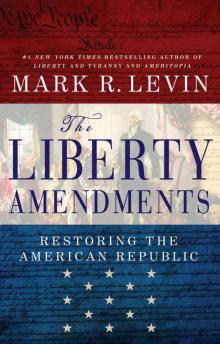 The Liberty Amendments: Restoring the American Republic
The Liberty Amendments: Restoring the American Republic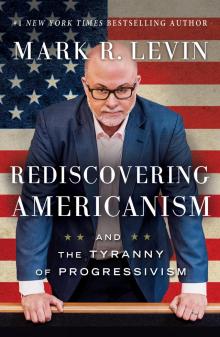 Rediscovering Americanism: And the Tyranny of Progressivism
Rediscovering Americanism: And the Tyranny of Progressivism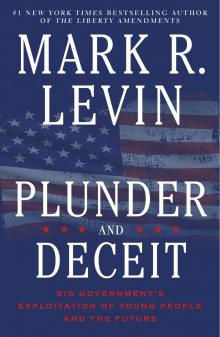 Plunder and Deceit: Big Government's Exploitation of Young People and the Future
Plunder and Deceit: Big Government's Exploitation of Young People and the Future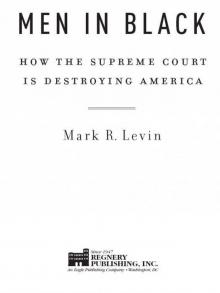 Men in Black: How Judges Are Destroying America
Men in Black: How Judges Are Destroying America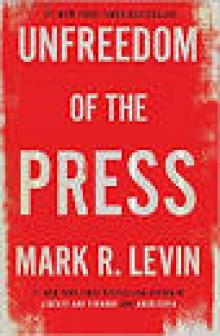 Unfreedom of the Press
Unfreedom of the Press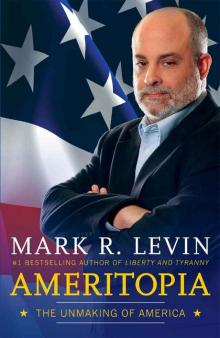 Ameritopia: The Unmaking of America
Ameritopia: The Unmaking of America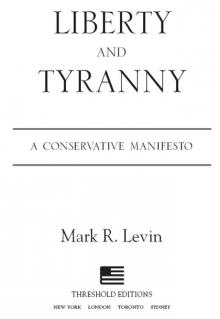 Liberty and Tyranny
Liberty and Tyranny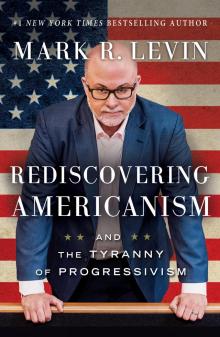 Rediscovering Americanism
Rediscovering Americanism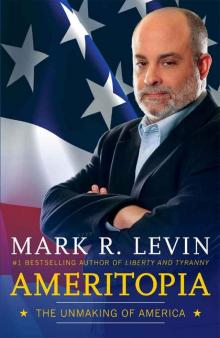 Ameritopia
Ameritopia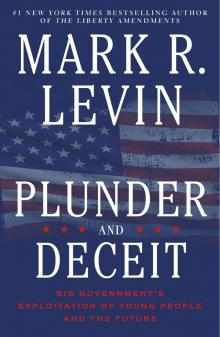 Plunder and Deceit
Plunder and Deceit